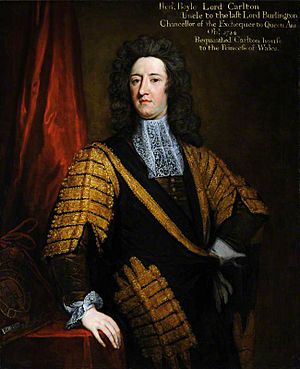Henry Boyle, 1st Baron Carleton facts for kids
Quick facts for kids
The Lord Carleton
|
|
|---|---|

Portrait by Godfrey Kneller
|
|
| Lord President of the Council | |
| In office 25 June 1721 – 27 March 1725 |
|
| Monarch | George I |
| Preceded by | Viscount Townshend |
| Succeeded by | The Duke of Devonshire |
| Personal details | |
| Born | 12 July 1669 |
| Died | 31 March 1725 (aged 55) |
| Education | Westminster School |
| Alma mater | Trinity College, Cambridge |
Henry Boyle, 1st Baron Carleton (born July 12, 1669 – died March 31, 1725), was an important politician from Ireland and England. He was a member of the Whig Party, which was one of the main political groups at the time. Henry Boyle served in both the Irish and British parliaments. He held very important jobs, like being in charge of the country's money (called the Chancellor of the Exchequer) and later becoming a top government minister (called the Secretary of State). He was also given the special title of Baron Carleton and became the Lord President of the Council, a very high position in the government.
Contents
Biography
Early Life and Education
Henry Boyle was born on July 12, 1669. His father was Charles Boyle, 3rd Viscount Dungarvan. Henry went to Westminster School, a famous school in London. After school, he traveled around Europe from 1685 to 1688. He even studied at Padua University in Italy in 1685.
Starting in Politics
Henry Boyle first joined the army. His uncle, Lord Rochester, helped him get started. However, Henry Boyle decided to join the Whig Party. The Whigs were a political group that supported more power for Parliament. In 1688, he left the army of King James II. Instead, he chose to support Prince William of Orange.
Becoming a Member of Parliament
In 1689, Henry Boyle was elected as a Member of Parliament (MP) for Tamworth. An MP is a person elected to represent an area in Parliament. He lost his seat the next year. For the next two years, he managed his family's lands in Ireland. In 1692, he became an MP for County Cork in the Irish Parliament.
Later in 1692, he was elected as an MP for Cambridge University. He had just joined Trinity College, Cambridge and earned a special degree in 1693. At first, he was known for speaking out against the government. But in 1697, he decided to support the government.
Rise to Power
Once he supported the government, Henry Boyle quickly moved up. In 1699, he became a Lord of the Treasury. This meant he helped manage the country's money. In 1701, he became the Chancellor of the Exchequer of England. This was a very important job, as he was in charge of all the government's finances.
Henry Boyle took on many other important roles. In 1704, he became the Lord Lieutenant of the West Riding of Yorkshire. He also became the Lord Treasurer of Ireland, managing money for Ireland. In 1705, he was elected as an MP for Westminster.
When Robert Harley left the government, Henry Boyle became even more powerful. He was made Secretary of State for the Northern Department. This meant he was in charge of foreign affairs for the northern parts of Europe. He worked closely with Lord Godolphin, who was the Lord Treasurer.
However, a group of powerful Whig nobles, known as the Junto, started to have more influence. In 1710, Henry Boyle decided to leave his government jobs. He stepped away from politics when a new government, led by Robert Harley and the Tory party, took over.
Baron Carleton
In 1714, a new king, George I, came to power. This was known as the Hanoverian succession. Because of this change, Henry Boyle was given a special new title. He became a Baron, which is a high rank in the peerage (a system of noble titles). His new title was Baron Carleton.
In 1721, he returned to government. He was made the Lord President of the Council. This was a very high position, where he led important meetings of the King's advisors. He held this job until he passed away in 1725.
Legacy
You can still find Henry Boyle's name in Cambridge. Carlton Way, a road in north Cambridge, is named after him. There is also a pub called The Carlton Arms on the same road.
Images for kids
 | Isaac Myers |
 | D. Hamilton Jackson |
 | A. Philip Randolph |


